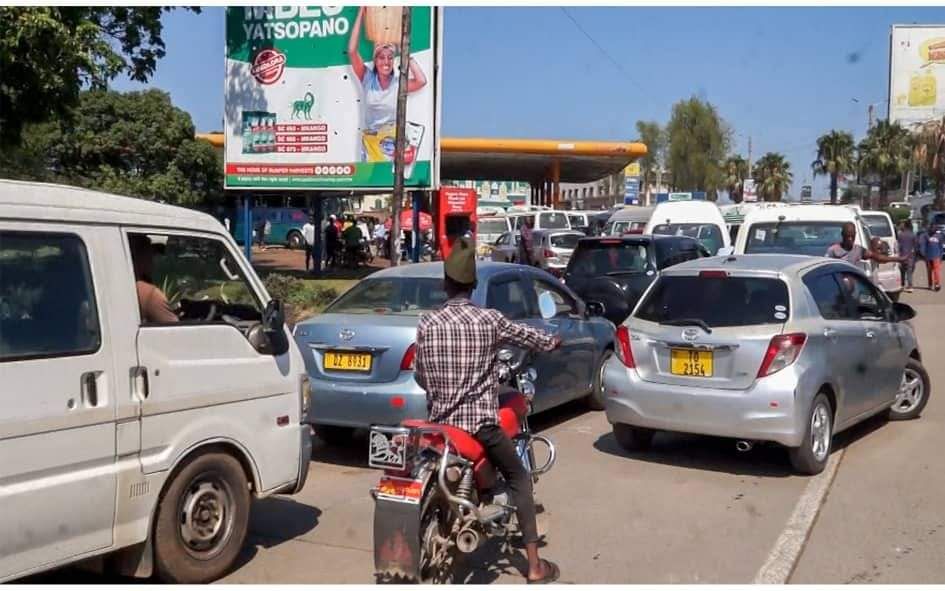By Twink Jones Gadama
In a nation where the sun rises and sets on the promise of progress, Malawi finds itself grappling with an unprecedented fuel crisis that has left citizens bewildered and frustrated.
The Malawi Energy Regulatory Authority (MERA), established to oversee the importation, storage, and sale of petroleum products, including petrol, diesel, and liquefied petroleum gas (LPG), is under scrutiny as the country faces fuel shortages that have brought daily life to a standstill.

For many Malawians, the fuel crisis is not just an inconvenience; it is a matter of survival.
Long queues at petrol stations have become a common sight, with motorists waiting for hours, sometimes days, to fill their tanks.
Public transport has been severely affected, leading to increased fares and a significant drop in mobility for those who rely on buses and taxis to get to work or school.
The crisis has also impacted businesses, with many unable to operate due to a lack of fuel for their vehicles and generators.
As the situation escalates, questions arise about the effectiveness of MERA in managing the country’s fuel supply. Established in 2004, MERA was tasked with ensuring a reliable and efficient energy sector in Malawi.
However, critics argue that the agency has failed to fulfill its mandate, leading to the current crisis.
One of the primary criticisms leveled against MERA is its inability to anticipate and mitigate fuel shortages.
The agency has been accused of being reactive rather than proactive, responding to crises only after they have escalated.
This lack of foresight has left the country vulnerable to external shocks, such as fluctuations in global oil prices and supply chain disruptions.
Moreover, MERA’s regulatory framework has been called into question.
Critics argue that the agency has not done enough to promote competition in the fuel sector, leading to monopolistic practices that drive up prices and limit access to fuel.
The lack of transparency in the pricing of petroleum products has also raised concerns, with many citizens questioning why prices continue to rise despite the government’s assurances of stability.
The fuel crisis has also exposed the weaknesses in Malawi’s infrastructure.
The country relies heavily on imports for its fuel supply, with most of the petroleum products coming from neighboring countries.
This dependence has made Malawi susceptible to supply chain disruptions, particularly during times of political instability or natural disasters in the region.
Critics argue that MERA should have worked to diversify the country’s fuel sources and invest in local production to reduce this vulnerability.
In addition to these structural issues, the crisis has highlighted the need for better communication between MERA and the public.
Many citizens feel left in the dark about the reasons behind the fuel shortages and the steps being taken to address the situation.
This lack of communication has fueled frustration and distrust in the agency, with many questioning its competence and commitment to serving the public.
As the crisis continues, some experts have begun to explore alternative solutions for sustaining fuel supply in Malawi without relying solely on MERA.
One potential avenue is the promotion of renewable energy sources, such as solar and wind power.
By investing in renewable energy infrastructure, Malawi could reduce its dependence on imported fossil fuels and create a more sustainable energy future.
Additionally, there is a growing call for the government to support local fuel production initiatives.
By encouraging the establishment of local refineries and biofuel production facilities, Malawi could create a more resilient fuel supply chain that is less susceptible to external shocks.
This approach would not only enhance energy security but also create jobs and stimulate economic growth.
Furthermore, enhancing public transportation systems could alleviate some of the pressure on fuel demand.
By investing in reliable and efficient public transport options, the government could reduce the number of private vehicles on the road, thereby decreasing overall fuel consumption.
This would not only help to ease the current crisis but also contribute to long-term sustainability.
In the short term, however, the government must take immediate action to address the fuel crisis.
This includes improving communication with the public, providing clear information about the causes of the shortages, and outlining the steps being taken to resolve the situation.
Additionally, the government should consider implementing temporary measures to stabilize fuel prices and ensure that essential services have access to fuel.
As Malawi navigates this challenging period, the role of MERA will be closely scrutinized.
The agency must demonstrate its commitment to transparency, accountability, and effective regulation if it hopes to regain the trust of the public.
The current crisis serves as a wake-up call for MERA and the government to reevaluate their approach to energy management and to prioritize the needs of the Malawian people.
In conclusion, the fuel crisis in Malawi is a complex issue that requires a multifaceted response.
While MERA has faced criticism for its handling of the situation, the path forward must involve collaboration between the government, regulatory agencies, and the public.
By embracing innovative solutions and prioritizing sustainability, Malawi can work towards a more secure and resilient energy future.
The time for action is now, and the stakes have never been higher for the people of Malawi.


